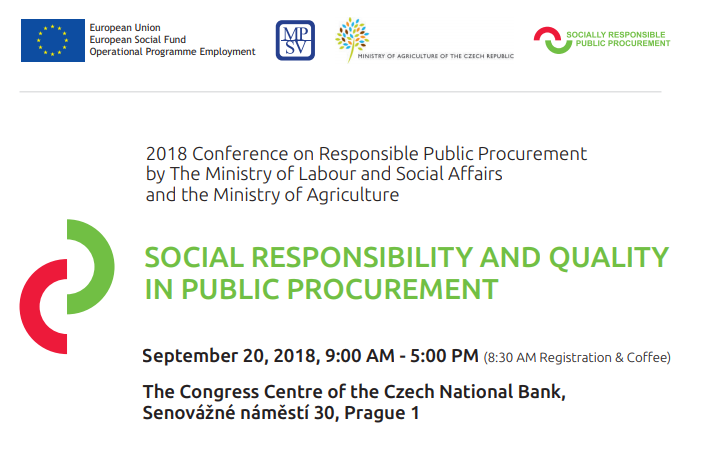

Topic I:
Public procurement quality begins with process setup and organization management
The purchasing power of public contracting authorities is a powerful tool that may be used to influence the market, put pressure on a higher degree of sustainability, and attain other effects with positive impact on the society as a whole. In addition to the specifically defined, socially beneficial objectives, a well-set-up purchasing systems helps improve public purchasing overall.
A number of examples from both Western and Central Europe, the Czech Republic included, testify that a good setup
allows contracting authorities to think through their purchasing system, emphasise strategy, interconnect individual
purchase phases, maintain overall control of the process, practise good communication with third parties, and
optimize the use of their previous experience.
The system approach to the public procurement setup is described in directive ISO 20400:2017. Many aspects are also
covered by guidelines published by the Czech Ministry of Finance. These documents, like experience shared by foreign
contracting authorities in discussions, may provide answers to the following questions:
Topic II:
Quality vs Price. What is the value of social responsibility?
During purchasing, contracting authorities naturally seek the lowest bid price. They should, however, try to find the best price/quality ratio while taking added social value into account. At the very least, contracting authorities should strive to avoid a negative impact on the social and environmental spheres, and wherever possible—without increasing the budget—should support the positive effects of any public procurement contract awarded. An exclusive focus on the lowest bid price is not beneficial, nor does it guarantee quality. Quality assessment is closely related to setting up and allocating weights to individual criteria, seeking the optimum ratio between evaluation criteria, allocating a specific number of points to individual bids, and self-assessment. Discussion of quality vs bid price should answer the following questions:
Topic III:
What is the relationship between quality and a sustainable supply chain?
The supply chain, i.e., a system of entities that stand between the raw material and the end customer, may be rather complex for some contracts. If contracting authorities wish to ensure that the performance of public procurement contracts paid for by public funds takes place under fair conditions—timely payments, legal employment, decent work conditions, and protection of the environment—they must consider the risk of failure to maintain such standards within their supply chain. Subcontractors' social responsibility, i.e., fair payments among businesses, decent work conditions for employees, protection of the environment, etc.—may, as a result, impact the quality of the material performance as such.
Among other issues to be considered is the reputation of public institutions and their responsibility for public procurement impact. The distance between a specific manufacturing process and the contracting authority may not serve as an alibi in considering sustainability. The following questions related to supply chain quality and responsibility will be discussed:
Interpretation into Czech-English will be available.
Entry is free of charge. Registration is necessary.
REGISTER HERE.
Find more details here.
View also article attached (in Czech) where experts answer the question Where does a contracting authority's responsibility for the context and impact of its purchasing begin and where does it end?.